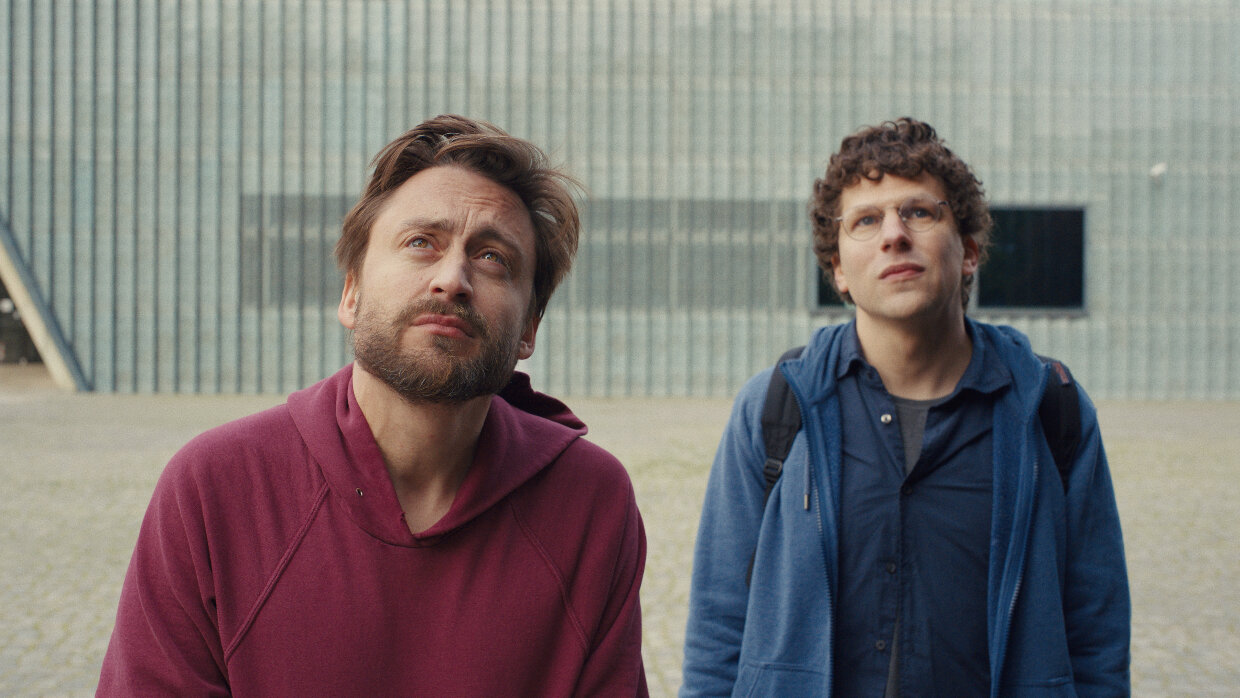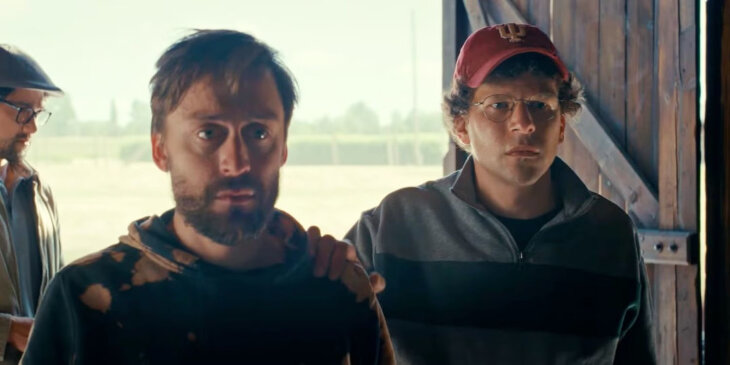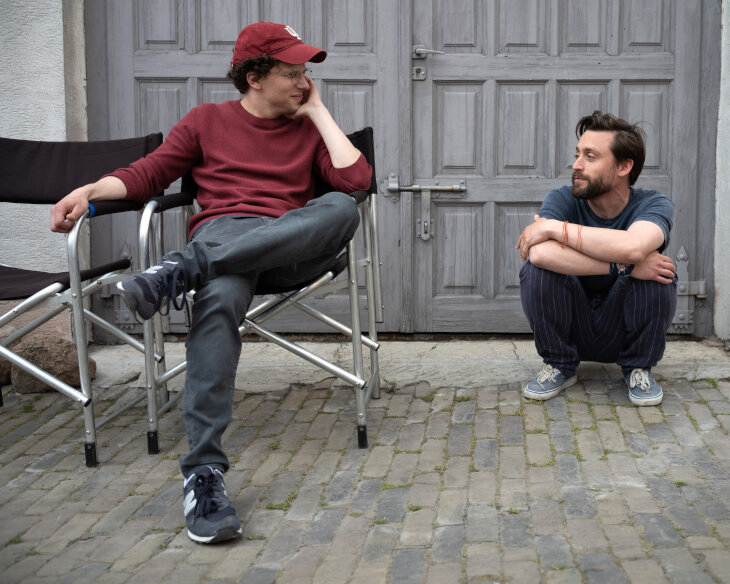 Marwan Barghouti & Hollywood’s Whitewashing of a Terrorist
Marwan Barghouti & Hollywood’s Whitewashing of a Terrorist


14 min read
6 min read
8 min read
His new film about two cousins trekking through Poland after the death of their grandmother is getting rave reviews.
In Jesse Eisenberg’s new film, “A Real Pain,” two quirky cousins, David (Jesse Eisenberg) and Benji (Kieran Culkin, in an acclaimed performance) go back to Poland to see where their recently deceased grandmother was from. As they embark on a Holocaust tourism tour, the grieving characters explore their troubled, nostalgic, bittersweet love they have for one another.
“They were kind of joined at the hip when they were younger and have since grown apart based on circumstance and personality,” explained Eisenberg, who wrote, directed, produced and stars in the nuanced film.
“When I set these characters on this tour, which is fraught with history and tragedy, it allowed their problems and interpersonal strife to really play out against the backdrop of something much bigger.”
Eisenberg hasn’t always connected with his Jewish identity, but got more interested due to a religious character he played.
“I grew up pretty reform and we would go to school on Sunday and Wednesdays. And then I kind of lost my, let's say, closeness to my own religion, like a lot of young people. I was doing a movie called ‘Holy Rollers,’ where I played a Hasidic Jew. And I went to learn about Hasidism from this school in Brooklyn, the 770 on Utica Avenue. It's this big center for Hasidism. And they let me in and actually gave me a bar mitzvah there in my research for this character.”
Getting his first bar mitzvah there was a unique experience for Eisenberg.
“That was a really unusual way to get it, with like 30 Hasidic men standing around me and me not knowing what was going on,” he quipped. “But wrapping this thing around [tefillin] my arm, while I was doing research for a movie–that was really unusual. And then my wife lost her parents, and temple became something that she wanted to engage more with, and I, of course, went with her. And now, it's like a part of our lives in that way. And it came really out of my wife's grief and hope to connect to something from her parents.”
He added: “But I'm probably speaking for more people than not, in discussing my kind of rollercoaster of experiences with my own faith. I imagine my experience probably mirrors so many other people, and that it's kind of circumstantial and vague and ambivalent and also nostalgic in a way, that will always be there for me.”
As he wrote the movie’s scenes, he felt drawn to Poland, where his grandmother comes from.
“We filmed this inside the house that my family lived in up until 1939, when they were taken out, of course during World War II. So there are so many autobiographical details in this movie, including when the characters talk about their grandma, and have all these very specific references to this woman in their lives. It’s based on my great Aunt Doris who died at 106; she was the most important person in my life.”
 Kieran Culkin and Jesse Eisenberg
Kieran Culkin and Jesse Eisenberg
From the time he was 17 years old, Eisenberg used her address to pretend that he lived in New York City so that he could go to public school in New York, even though he actually resided in New Jersey.
“She was my closest friend,” Eisenberg acknowledged. “I even lived with her in my early thirties. Especially as I became an actor and sometimes would lose my way, in terms of feeling a sense of groundedness. She grounded me. She was really tough on me and was really an unusual character. And because she was born and raised in Poland, it really sparked my interest in seeing where she’s from…I was really just interested in her life. I wanted to know every single thing about her. I wish she was alive to know that we filmed inside the little room that she lived in a hundred years ago.”
The two would spend every Thursday together in the afternoons.
“I told her, ‘Doris, if I ever get a job in Europe, I will go and visit the house that you lived in.’ And I got a job doing a movie in Bosnia and my wife met me there and we drove to the house. I took pictures for her of the house that she hadn’t lived in in 80 years. And I became interested in my own history and why don’t I feel a connection to this house? Why have we ignored this history? The war has made my family feel so separated from Poland and from their history because of the trauma that they had from the war. And I wanted to reconnect to that.”
Eisenberg was so fascinated by Poland it inspired him to get his citizenship from Poland which he is receiving on November 17th. “I really wanted to forge a connection that had been so tragically lost in Europe.”
In doing research for the film, Eisenberg and his wife did the exact trip that the characters do in 2008, backpacking through all of Poland. He is one of the very few people who got permission to spend a day shooting his film in Majdanek.
“And then when I was writing the movie, it was during Covid and it was hard to travel there for research. So I essentially did a Google Street view, walking street by street of where these characters would go, to the point where I knew I would want them to go from this particular monument to this particular park.”
Eisenberg has been writing mostly theater for the last 20 years, and has previously focused on the Holocaust in 2013, in his play, “The Revisionist.”
 Jesse Eisenberg and Kieran Culkin on set
Jesse Eisenberg and Kieran Culkin on set
“The first play I wrote when I was 22 was called ‘The Revisionist’ and it starred me and Vanessa Redgrave,” he told Aish.com. “She played my second cousin Maria who survived the war and stayed in Poland up until Covid, when she passed away, unfortunately after surviving the Holocaust. I guess you can say ironically in some ways, to die of something like Covid after surviving that.
“In all of my plays, I have had basically a certain interpersonal dynamic between the characters that can feel fun and light and irreverent, but never at the expense of some of the bigger themes that I’m trying to address,” he noted.
“And it’s the same with this movie. I wanted to create a dynamic between the characters that felt real and funny and irreverent and authentic, and then throw those characters into something that has much greater weight and heft and thematic import, but still maintain their relationship.”
Eisenberg’s goal was to talk about these big themes but in a way that doesn’t alienate the audience.
“That seems to be the overwhelming reaction to the movie, is that people don’t feel like it’s a homework assignment or that I’m trying to kind of preach to them about my political viewpoints, which is just the furthest thing from my personal creative desires.”
Eisenberg is inspired to write about everything in his life.
“I pick anything that’s happened to me or my family, anything I could possibly relate to that has some kind of heft or unanswered questions for me. And this movie in particular is trying to answer an unanswered question for me, which is how does my personal pain of my struggles with mental health and emotional struggles, how does that rate, compared to the pain of my ancestors which is objectively more horrible? And is my pain valid or should I shut up
and sit quietly? Is my pain worthy of talking about or is it a petty grievance of a really privileged American?”
He continued: “And so that’s the question I’m trying to ask with this movie. That’s why I set it against the backdrop of this big thing. I’m certainly not trying to make a commentary on World War II or Holocaust history, I’m not an expert or an academic, my parents are. But I’m not. And I’m really just talking about my own personal grief. And this movie is far more of a therapeutic session for me than it is a kind of let’s say academic commentary on third generation Jewry. I hope that’s okay.”
Eisenberg hopes audiences of all cultures will relate to his “very personal” story and family experience, for everybody who is curious about where they came from.
“Like when I gave the script to my friend who’s Haitian and he read it and said, ‘Oh, yeah, this is why I went back to Haiti, I wanted to see where my family’s from.’ That’s kind of the reaction I hope for, is that the specific experience of my relationship to my family is the universal experience for anybody who comes from another place and is curious about it. That’s really my true hope.”

His great Aunt Doris must be smiling down from Shamayim
knowing the influence she had on Jesse's life and American cinema.
I am first generation American. My parents had the fortune to leave Kobrin, Poland just before it was invaded in 2939. Their area of Poland in now Belarus, which I do not think is safe to visit. I regret not having the opportunity to see t where my parents were born and our extended family was murdered in the Holocaust.
Interesting piece. One minor point: you “become” a bar mitzvah; you don’t “get” one. A bar mitzvah is the person, not a thing. Enjoyed the movie.
A very sensitive and challenging film that requires a thoughtful and reflective response. Magnificent performances. Complex writing with humor, irony and depth of thought and feeling. A film that should find its audience as word about its quality and challenge spreads. Thank you, Jesse Eisenberg and cast.
I'm 72. I remember Vanessa Redgrave as a rabid Jew hater from many years ago. How odd is it that she would be in a movie with him.
I love his idea of this movie as a kind of group therapy. Our world needs more opportunities for "public group therapy". I'm a proud Ashkenazi (Polish and Russian) Jew, but I am also a fourth-generation American. A Jew who's family was here before The Holocaust. I grew up in a community full of survivors, I was one of the few children who didn't have at least one survivor grandparent. It took me until I was in my 20s to understand that although the Holocaust is not a direct part of my personal family history, it is still my story because it is part of our collective his
I've been a "fan" of Eisenberg since "The Squid and the Whale", a movie set in Park Slope, Brooklyn. I will make it a point to see this new movie, as it resonates with my own desire to learn of the actuality of my grandparents lives, who immigrated from the Pale (Russian territory confining Jews), in the early 20th Century.
As a daughter of a Holocaust survivor who recently passed at age 95, I am so appreciative there is a film like this not just for survivors, not just for second or third generations but for everyone who searches for faith especially in the world we live in today. I look forward to seeing it when I am able to. Thank you very much Mr Eisenberg.
Thank you I will try to see the film if I can
I heard there’s a country with a Jewish past even older than Poland’s that one can become a citizen of. Not only that, but it has a Jewish present and future.
I will defiantly want to see the film, however, visiting Poland the birth place of my parents, grandparents, sisters and more I will not simply because Poland today is not the same as it was pre WWII as it was pulverized to the ground. Nothing left to connect me with Poland.
I agree, even a episode of "The Twilight Zone"" Dead Head Revisited" said in the end of the episode "Europe is a huge graveyard what they did to Jews and we must remenmber and never forget and bear witness" I think he said something along those lines, my mom( obm) was a Holocaust Survuvor from Poland and told me about the very anti semitc Poles, that is why the Nazis( may their name be erased) made the worst and biggest Concentratation Camp and killing place in Poland Auschwitz was a Polish town that had a Polish name with O
Rea I like you have.no desire to go to Poland, but not for the same reason. My grandparents on both sides of the family came to Canada after the first World War, leaving their families behind in Poland. However, I feel no “ pull” to connect with ʻPoland despite our family’s centuries old roots there. It was never a warm & inviting “ home” for it’s millions of Jews.The Jews of Poland & the rest of Eastern Europe, were not accepted as fellow countrymen but seen rather as foreign vermin & despised. As one author wrote, Jews were the “ Ni__ars¯of Europe. In spite of being in Poland & the rest of eastern Europe for over a milennia,they were not wanted. The Naziis gave all Europe what it wanted, to have no Jews!
"The Jews of Poland & the rest of Eastern Europe, were not accepted as fellow countrymen but seen rather as foreign vermin & despised. "
and why do you think so many Jews were living in Poland? Because they were not accepted in western Europe, which you love so much.